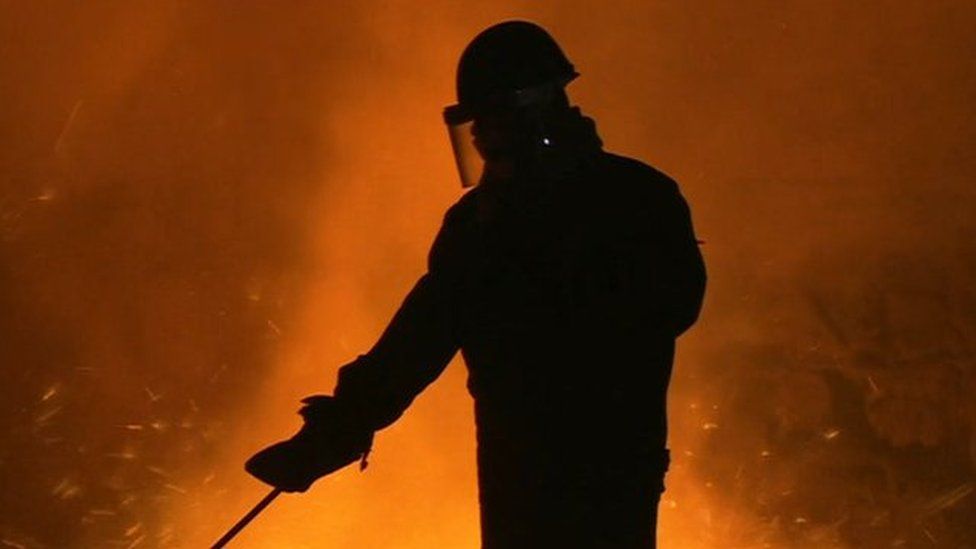Post-Brexit taxes for steel 'very damaging', says Kinnock
- Published

Some steel products could face post-Brexit taxes within months, the sector has warned.
UK Steel said it was "likely" that export quotas for some products would run out in the first quarter of this year - meaning exports would face a 25% tariff.
Aberavon MP Stephen Kinnock said the UK government should renegotiate the "very damaging" new quotas with the EU.
The UK government said it would "engage intensively" with the sector.
Tata Steel UK employs about 8,000 people in the UK, the majority of which are in Wales with about half based at Port Talbot.
'Damaging'
In the year to March 2020 - before the coronavirus pandemic hit demand for steel - Tata Steel UK made a pre-tax loss of £654m and there have been ongoing calls for financial support from the UK Government.
But Welsh Labour MPs told BBC Politics Wales the latest challenge for the sector could be the changes agreed in the post-Brexit trade deal at the end of last year.
'Very troubling'
"Boris Johnson has said that the Brexit deal is no quotas and no tariffs - that is just not true," said Mr Kinnock, whose constituency includes the Port Talbot steelworks.
"The steel industry is going to be subjected to 25% tariffs on every tonne of steel that we export to the European Union above a certain quota.
"What's even worse is steel going from Great Britain to Northern Ireland will be included in the calculation of that quota, so we really have got a very troubling situation that could have a very damaging impact on our steel industry.
"We need the government to get back to the negotiating table with the European Union.
"The big question is, does the European Union have any incentive to get back to the negotiating table now the deal is done. Have we lost all of our leverage?"
There are now separate quotas for UK steel trading with the EU for 29 different steel products.
UK Steel, which represents manufacturers, said some of those quotas were likely to run out in the first quarter of this year.
'Huge problems'
"The official expiry date of the EU safeguard measure [quotas] is June 2021, but it is looking increasingly likely that they will be extended beyond this period - perhaps for another three years," a spokeswoman said.
"If the UK can't get an exemption, or its quotas expanded, it will cause huge problems for the UK steel sector."
She said Brexit was also impacting how much steel the UK can expect to export due to customs delays, a shortage of hauliers and concern from EU customers.
Is state aid the answer?
Mr Kinnock has urged the UK government to provide support to the industry.
Steel analyst Kathryn Ringwald Wildman said more state aid could have been given, even while a member of the EU, while the steel industry is among many sectors asking for help following the coronavirus pandemic.
"One is inclined to think that because [the UK government] expressed such concern over the ability to use state aid that they intend to use state aid," she said.
"However, in the past they haven't used it to the maximum, even within European regulations.
"Within European regulations, some countries were able to give their steel industries much more support with relation to energy costs than the UK government chose to do."
She said the UK government would be weighing up whether steel remains a "strategic industry".
"Many would say yes - we have a strong manufacturing sector [so] you need a thriving steel industry [however] now we have competing voices for support.
"Industries like hospitality, leisure and tourism, retail, have all been devastated by the pandemic and seeking help to recover. The government has to decide what are their priorities, where is the economy going to be best served in the long-term."
Prof Kent Matthews, economist at Cardiff University, said any steel subsidy would need a time limit.
"The main challenges are in terms of value for money," he said.
"The Treasury's argument will be they don't want to keep throwing money at something that's not going to produce a return at all.
"The long-term effect for steel coming out of Brexit, if nothing changes, is that it will be absolutely destroyed by world markets. So the arguments for subsidising are ones of giving it breathing space to be able to up their game, invest in the right technologies and move up the value chain.
"There are arguments for permanent subsidies for certain industries but steel is not one of them because it's a tradable good, it's something that can be got from outside."
The UK government said it was in continuing discussions about increasing quotas for exports into the EU single market.
A UK government spokesman said: "We have worked successfully with the European Commission to secure tariff rate quotas for some steel products to enable UK companies to trade tariff-free into the EU.
"These tariff-free allocations came into operation on 1 January 2021.
"The government will continue to engage intensively with the sector to understand their concerns and requirements."
- Published18 November 2020
- Published14 November 2020
- Published14 March 2016
- Published28 December 2020
- Published9 January 2021